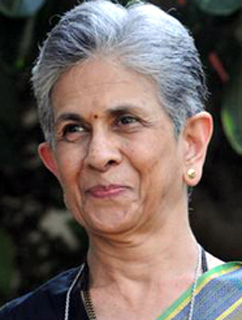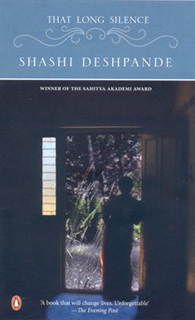
photo © Anant Nath Sharma , 2012 (cropped)
by Farah Ahamed
‘What we want to reach at finally is the telling, the breaking of silence.’
~ Shashi Deshpande
Shashi Deshpande is an important contemporary voice amongst Indian writers and her works have received acclaim for her realistic representation of middle-class Indian women. She was born in 1938 in Dharwad, India, the second daughter of a playwright. When she was fifteen she moved to Mumbai to study Economics and then to Bangalore to read Law and Journalism. In the 1960s she began writing short stories about the societal and cultural systems that constrained individual freedoms in India. Her writing explores the conflict between authority and freedom, as well as negotiating gender stereotypes, and, although her stories are unmistakably Indian, the themes she addresses are universal: self-revelation, social reality and dogma, spiritual and traditional values, family life, romance and the subordinate role of women. She depicts the anguish of the modern educated Indian woman, caught between patriarchy and tradition on the one hand, and self-expression and autonomy on the other. Her protagonists seek individual fulfilment, independent of traditionally ascribed roles within the family: daughter, wife and mother.
 Deshpande sees the notion of family as instrumental to the development of self; in a 2004 interview with The Hindu, she said: ‘The family is where everything begins, and everything that happens outside the family mirrors what happens within it.’ In ‘The First Lady’, a woman marries a man she admires for his high political ideals. The man rises in influence in government and the title of the ‘First Lady’ is bestowed upon the woman. She realises her husband’s political claims ‘were a sham, […] a mask’, spoken only to gain power and status. She is disillusioned by the ennui of her life and her husband’s pretences, but she is unable to break out of her traditional familial and social bonds. Her title merely serves as a constant reminder that she exists at the margins of society and in the shadow of her husband. “We have lived too long,” she says to herself. For Deshpande, self-revelation is a cruel process.
Deshpande sees the notion of family as instrumental to the development of self; in a 2004 interview with The Hindu, she said: ‘The family is where everything begins, and everything that happens outside the family mirrors what happens within it.’ In ‘The First Lady’, a woman marries a man she admires for his high political ideals. The man rises in influence in government and the title of the ‘First Lady’ is bestowed upon the woman. She realises her husband’s political claims ‘were a sham, […] a mask’, spoken only to gain power and status. She is disillusioned by the ennui of her life and her husband’s pretences, but she is unable to break out of her traditional familial and social bonds. Her title merely serves as a constant reminder that she exists at the margins of society and in the shadow of her husband. “We have lived too long,” she says to herself. For Deshpande, self-revelation is a cruel process.
Deshpande’s novel That Long Silence captures the leitmotifs running through all her short stories. Jaya’s life falls apart when her husband is suspended from work after allegations of malpractice against him. Her ordinary existence is disrupted; the future of the family is in jeopardy. Jaya is an unsuccessful writer, haunted by memories. Differences with her husband, frustrations in their seventeen-year marriage, disappointment in her two teenage children, and the claustrophobia of her childhood all begin to surface. She says: “surely there comes a moment in every human life when he or she says, like the Sibyl – I wish to die.” In her small, suburban Bombay flat, Jaya grapples with these and other truths, among them her failure at writing and her fear of anger. Deshpande portrays a woman trying to erase a ‘long silence’ begun in childhood: ‘I had learnt it at last, no questions, no retorts, only silence.’
For Deshpande, female autonomy and selfhood relate to sexuality and identity; she explores the body as a site of subjugation and social control. In ‘The Intrusion’, a couple are on their honeymoon at a seaside village. The groom makes advances towards his bride who is lost in reflections of her past life and their arranged marriage. He says:
“Know each other? What does this matter? Aren’t we married now? And how will we start getting to know each other if you put on such a touch me nottish air?”
The bride resists exposing her body to this stranger: But how can I, with a man I scarcely know? It’s not fair, I thought angrily. It’s indecent. He should have given me some time. What a way to spend our honeymoon.’ She drifts off into sleep and dreams of the sea shore, but wakes to find ‘it was not the sea that was pounding my body, but he, my husband, who was forcing his body on mine’. In spite of her anger, she surrenders to ‘his humiliation of her’.
Deshpande emphasises female friendships as necessary for resisting these forces. In ‘A Liberated Woman’, a less educated husband bullies his liberal, educated wife. Because of societal expectations, the wife smothers her desire to protest or sever the relationship. She seeks solace from a female friend whose thoughts reflect the indignity of the wife’s situation:
But what really astonishes me is her feebleness, her attitude of despairing indifference. Surely she, an educated earning competent woman has no right to behave this way – to plug all her escape routes herself and act like a rat in a trap.
 A recurrent theme in Deshpande’s work is a yearning for freedom and self-realisation. In ‘I want’, Alka is at a wedding party where she is subjected to insolent stares and impertinent questions by men. She feels uneasy and anxious and thinks, ‘The woman in me was outraged and protested. I crushed her. She had no place there. None at all’. But then later she says: “I had a shape and form I had to preserve. A self I had to treasure.” It is characters like these that are fettered to their familial roles. They question their subordinate status in society, but are unable to revolt. They live a complex reality which is often ironic and even absurd. To stay in a constraining relationship is to live in bad faith; silence and endurance achieve nothing. But to leave is to take on a heavy burden of guilt. Deshpande offers no solution to the problem, but observes in ‘Small Remedies’ that ‘women without men … are totally different creatures’.
A recurrent theme in Deshpande’s work is a yearning for freedom and self-realisation. In ‘I want’, Alka is at a wedding party where she is subjected to insolent stares and impertinent questions by men. She feels uneasy and anxious and thinks, ‘The woman in me was outraged and protested. I crushed her. She had no place there. None at all’. But then later she says: “I had a shape and form I had to preserve. A self I had to treasure.” It is characters like these that are fettered to their familial roles. They question their subordinate status in society, but are unable to revolt. They live a complex reality which is often ironic and even absurd. To stay in a constraining relationship is to live in bad faith; silence and endurance achieve nothing. But to leave is to take on a heavy burden of guilt. Deshpande offers no solution to the problem, but observes in ‘Small Remedies’ that ‘women without men … are totally different creatures’.
Her ideas echo those of many Western feminists, particularly Simone de Beauvoir, who wrote, in Second Sex: ‘It has been said that marriage diminishes man, which is often true, but almost always it annihilates women’. But, rather than subscribing to Germaine Greer’s belief that women should not marry, Deshpande’s brand of feminism is about how to remain ‘intact’ while loving another. She asks if it is possible to ‘assert oneself and not to be aggressive, to escape domination and not dominate’. She expands on this in her essay ‘Why am I a feminist?’
The way I see the world is coloured by this fact of my being a woman, by the historical and social circumstances of women’s lives […] Nevertheless, when I sit down to write, I am just a writer, my gender ceases to matter to me. I am concerned with the same problems as any writer; the problems of language, narrative, structure, continuity’ […] I am a ‘humanist feminist’ and I write what I write because I have to. Because it is within me.
Deshpande insists on recognition as a ‘writer’ without the qualifiers ‘woman’ or ‘feminist’, arguing that the categorisation of ‘women’s writing’ – separate from the mainstream – is an aspect of patriarchal politics: ‘Marginalisation begins here, for with this label one is edged away from the group or writers in general.’
At the same time, she makes no concessions to marketability. Her stories are not exotic, but are true to the reality of life in India, the familiar and mundane. Her writing style has neither flamboyance nor self-conscious literary flourish, suggesting no distinction between her social and literary self.
It’s meaningless that people know me as a person and not know what I’ve written […] publicity is not a good thing for a writer. It detracts you from your work. You become more interested in yourself as a person than as a writer. I’d rather be known for my books than for myself. I’m happy with this anonymity. Once you get publicity-conscious, your writing becomes affected.
Like other Indian writers writing in English, such as Anita Desai and Kamala Das, Deshpande’s short stories are embedded in the Indian context. Aside from gender and patriarchy, she explores the nature of identity, human will and the predicament of relationships. While her characters attain some degree of self-awareness, they do not rebel against entrenched tradition, but try to accommodate, and adjust to, their situations. Through her apt dialogue, realistic setting and profound insights into character, Deshpande’s short fiction aims to give voice to the subaltern, the silenced and the marginalised.
~
Farah Ahamed is a Kenyan lawyer now living in the UK. She has a diploma in creative writing from the University of East Anglia. She has been published by Kwani?, Bridge House, Fey, New Lit Salon Press, The Missing Slate and Out of Print. She was shortlisted for the 2014 Leeds Literary Prize for a collection of stories, nominated for the Pushcart 2015 and Caine Prize for African writing 2016, and a finalist in the Out of Print/DNA 2015 Short Story Competition.

